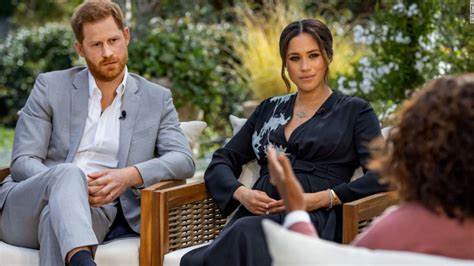The interview made headlines for days before it was broadcast last night, and somehow, it still managed to exceed expectations. Meghan Markle and her husband, Prince Harry, sat down with Oprah Winfrey to talk about stepping back from their positions as senior members of the British royal family last year and eventually moving to Los Angeles. Over two hours of TV on CBS, they laid out their painful reasons for that decision, including a barrage of racist abuse from British tabloids and a lack of support from Buckingham Palace.
(SOUNDBITE OF ARCHIVED RECORDING)
MEGHAN MARKLE: They were willing to lie to protect other members of the family, but they weren't willing to tell the truth to protect me and my husband.
SHAPIRO: We're joined now by Linda Holmes, who hosts NPR's Pop Culture Happy Hour podcast.
Hi, Linda.
LINDA HOLMES, BYLINE: Hi, Ari.
SHAPIRO: You were live-tweeting this interview last night. Run through some of the biggest revelations for us.
HOLMES: Well, there were certainly, you know, a couple of details of their lives together that were on the lighter side — the fact that they legally married, you know, more privately a couple of days before their big, splashy royal wedding. They talked about that. They talked about the fact that their baby who's due this summer is a girl. They gave, certainly, as you said, more information about how hard they had tried to get more support from the palace about the media harassment of Meghan.
But I think what landed the most vividly were really two things. One was how much they both felt the family not only wouldn't deal with the racism that Meghan was facing as a biracial woman — her father is white, and her mother is Black — but the family was part of it. They said that at least one conversation happened between Harry and someone in the family — they would not say who — in which the person sort of inquired about what their children's skin color might be and, you know, how dark they would be and how that would look. So that was one, I think, big thing. And the other big thing was Meghan talking about having had a serious mental health crisis, including pretty serious thoughts of suicide.

SHAPIRO: The conversation has struck such a chord here in the U.S., including with people who don't typically care about the royal family. Do you think that's because of these themes of racism and mental health that so many people have had experience with can relate to? Why do you think this is?
HOLMES: I do. I think the racism, you know, certainly exists outside the British tabloid press and the royal family, right? Meghan feeling like she was given no support and then attacked for supposedly failing is very resonant, I think, for a lot of Black women, as are the times that she was unfavorably compared to Kate, Prince William's wife, her sister-in-law, who as a white woman was often praised for doing some of the same things, right?
And by the same token, I think when she spoke about mental health, if you've been depressed, that resonates even though her circumstances are unique. And I think for a lot of people, this interview also really helped advance the sense of the monarchy as an institution where a lot of the power lies with kind of staff, people who aren't even family members. And that institution, like a lot of workplaces and governments and media organizations, can be profoundly racist and profoundly destructive to people's mental health.
SHAPIRO: So speaking of media organizations, as you say, it's not only the royal family that came under a harsh light in this conversation. It was also the British tabloid press. Tell us about that.
HOLMES: Yeah. Harry and other members of the family have been critical of the tabloids before. But you know, he spoke Sunday night about what he called a sort of invisible contract between the family and the tabloid press, where essentially, the family feels at the mercy of those tabloids and can't really stand up to them. He said that the firm, which is the word they sort of use to describe the kind of formal and informal power structure, really is controlled by fear of the tabloids.
SHAPIRO: There are so many comparisons being made today to Princess Diana's 1995 BBC interview, which people remember for this famous line about three of us in the marriage...
HOLMES: Yeah.
SHAPIRO: ...Talking about Prince Charles' relationship with Camilla Parker Bowles. How would you compare the role that Diana's playing to this situation today?
HOLMES: Well, Diana loomed very large over this interview, I think. For one thing, you know, Harry said he's been cut off financially by the family. So the money that he has is actually the money that his mother left him. But more significantly, he spoke about not wanting history to repeat itself, not wanting Meghan to be hurt the way his mother was hurt, which I think is very — you know, that's very sad and very understandable.
SHAPIRO: NPR's Linda Holmes of our Pop Culture Happy Hour podcast.
Thank you so much, Linda.
HOLMES: Thank you, Ari.













